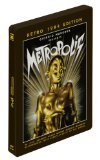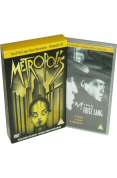![Metropolis [1926]](/pictures/1013374.jpg) Metropolis | DVD | (27/01/2003)
from £N/A
| Saving you £N/A (N/A%)
| RRP
Metropolis | DVD | (27/01/2003)
from £N/A
| Saving you £N/A (N/A%)
| RRP Fritz Lang's Expressionistic masterwork continues to exert its influence today, from Chaplin's Modern Times (1936) to Dr Strangelove (1963), and into the late 1990s with Dark City (1998). In the stratified society of the future (Y2K no less), the son of a capitalist discovers the atrocious conditions of the factory slaves, falling in love with the charismatic Maria in the bargain, who preaches nonviolence to the workers. But even the benevolent leadership of Maria is a challenge to the privileged class, so they have the mad-scientist Rotwang concoct a robot double to take her place and incite the workers to riot. The story is melodrama, but it's the powerful imagery that is so memorable. One of the most arresting images has legions of cowed workers filing listlessly into the great maw of the all-consuming machine-god Moloch. Unfortunately, the print used for this DVD is unfocused, scratchy, and five minutes short, altogether unworthy of a visionary masterpiece. It may be too much to hope for the complete film to be restored (only two hours of the original three-hour film are extant), but a clean transfer from a fine-grain negative ought to be possible. And why, when there are other possible future Metropolises to be had, should we downtrodden masses accept this junk? --Jim Gay
![THE LOVE OF JEANNE NEY [Die Liebe der Jeanne Ney] (Masters of Cinema) Blu-ray](/pictures/1157070.jpg) THE LOVE OF JEANNE NEY | Blu Ray | (06/12/2021)
from £10.75
| Saving you £N/A (N/A%)
| RRP
THE LOVE OF JEANNE NEY | Blu Ray | (06/12/2021)
from £10.75
| Saving you £N/A (N/A%)
| RRP An epic of the Weimar cinema, The Love of Jeanne Ney follows a young French woman's struggle for happiness amid the political turbulence and corruption of post-World War I Europe. A tour de force for director G. W. Pabst (Diary of a Lost Girl, Pandora's Box), the film blends a variety of cinematic approaches as it weaves its complex narrative of moral chaos and political upheaval: the American Style, evocative of the Hollywood studio blockbuster; the avant-garde techniques of Soviet montage; as well as the eerie moving camerawork and shadowy perspectives typical of German Expressionism. The result is a stunning cinematic experiment that never fails to surprise the viewer as it races towards its exhilarating conclusion. Available for the first time in the UK, the Masters of Cinema Series is proud to present The Love of Jeanne Ney on Blu-ray. Bonus Features 1080p presentation on Blu-ray, fully restored with a score by Bernd Thewes Optional English subtitles Alternate US release version with music by Andrew Earle Simpson Too Romantic, Too Ghastly Brand New video essay by David Cairns and Fiona Watson PLUS: A collector's booklet featuring new writing on the film by Philip Kemp *All extras subject to change
![Metropolis -- Two Disc Special Edition [1927]](/pictures/1012629.jpg) Metropolis -- Two Disc Special Edition | DVD | (27/01/2003)
from £N/A
| Saving you £N/A (N/A%)
| RRP
Metropolis -- Two Disc Special Edition | DVD | (27/01/2003)
from £N/A
| Saving you £N/A (N/A%)
| RRP If you think you know Fritz Lang's Metropolis backwards, this special edition will come as a revelation. Shortly after its premiere, the expensive epic--originally well over two hours--was pulled from distribution and re-edited against Lang's wishes, and this truncated, simplified form is what we have known ever since 1926. Though not quite as fully restored as the strapline claims, this 118-minute version is the closest we are likely to get to Lang's original vision, complete with tactful linking titles to fill in the scenes that are irretrievably missing. Not only does this version add many scenes unseen for decades, but it restores their order in the original version. Until now, Metropolis has usually been rated as a spectacular but simplistic science fiction film, but this version reveals that the futuristic setting is not so much prophetic as mythical, with elements of 1920s architecture, industry, design and politics mingled with the mediaeval and the Biblical to produce images of striking strangeness: a futuristic robot burned at the stake, a steel-handed mad scientist who is also a 15th Century alchemist, the trudging workers of a vast factory plodding into the jaws of a machine that is also the ancient God Moloch. Gustav Frohlich's performance as the hero who represents the heart is still wildly overdone, but Rudolf Klein-Rogge's engineer Rotwang, Alfred Abel's Master of Metropolis and, especially, Brigitte Helm in the dual role of saintly saviour and metal femme fatale are astonishing. By restoring a great deal of story delving into the mixed motivations of the characters, the wild plot now makes more sense, and we can see that it is as much a twisted family drama as epic of repression, revolution and reconciliation. A masterpiece, and an essential purchase. On the DVD: Metropolis has been saddled with all manner of scores over the years, ranging from jazz through electronica to prog-rock, but here it is sensibly accompanied by the orchestral music Gottfried Huppertz wrote for it in the first place. An enormous amount of work has been done with damaged or incomplete elements to spruce the image up digitally, and so even the scenes that were in the film all along shine with a wealth of new detail and afford a far greater appreciation for the brilliance of art direction, special effects and Helm's clockwork sexbomb. A commentary written but not delivered by historian Ennio Patalas covers the symbolism of the film and annotates its images, but the production information is left to a measured but unchallenging 45-minute documentary on the second disc (little is made of the astounding parallel between the screen story in which Klein-Rogge's character tries to destroy the city because the Master stole his wife and the fact that Lang married the actor's wife Thea von Harbou, authoress of the Metropolis novel and screenplay!). There are galleries of production photographs and sketches; biographies of all the principals; and an illustrated lecture on the restoration process which uses before and after clips to reveal just how huge a task has been accomplished in this important work. --Kim Newman
 Giorgio Moroder Presents: METROPOLIS (LIMITED EDITION DVD STEELBOOK) | DVD | (23/07/2012)
from £29.99
| Saving you £-10.00 (N/A%)
| RRP
Giorgio Moroder Presents: METROPOLIS (LIMITED EDITION DVD STEELBOOK) | DVD | (23/07/2012)
from £29.99
| Saving you £-10.00 (N/A%)
| RRP In the era when one could still but only dream of a comprehensive restoration of Fritz Lang's silent sci-fi epic Metropolis, esteemed pop artist/producer and pioneering electronic composer Giorgio Moroder followed his work on Brian De Palma's cult-classic Al Pacino vehicle Scarface by assembling his own version of Lang's 1920s classic. The result was a zeitgeist-infused, high-kitsch/high-art amalgam of some of the quintessential cinema images and then-contemporary 1980s pop-chart melodrama. For millions around the world, it is this version of Metropolis – featuring music by Moroder himself and artistes such as Adam Ant, Pat Benatar, Freddie Mercury, Bonnie Tyler, and Jon Anderson – which first comes to mind whenever mention is made of the Lang original or, indeed, the iconic imagery and power of silent cinema.
![Metropolis [UMD Universal Media Disc]](/pictures/1038397.jpg) Metropolis | UMD | (03/04/2006)
from £N/A
| Saving you £N/A (N/A%)
| RRP
Metropolis | UMD | (03/04/2006)
from £N/A
| Saving you £N/A (N/A%)
| RRP  Metropolis/M - Ultimate Box | DVD | (22/11/2003)
from £N/A
| Saving you £N/A (N/A%)
| RRP
Metropolis/M - Ultimate Box | DVD | (22/11/2003)
from £N/A
| Saving you £N/A (N/A%)
| RRP Metropolis: Set around the year 2000 a mammoth city is ruled by the super-efficient industrialist Jon Fredersen (Alfred Abel) and on the surface appears to be a utopian dream with wealthy inhabitants living in palatial apartments set in colossal glass and concrete spires. But underground it's a different story - armies of slaves work gruelling shifts to maintain the luxurious lifestyles of their masters. The workers a subhuman species of sluggish creatures are led by the saintly Maria (Brigitte Helm) who urges them not to rebel but to wait patiently for the arrival of the mediator. Fredersen kidnaps Maria and orders mad scientist Rotwang (Rudolf Klien-Rogge) to create a robot replica to take her place. His plan is doomed when the evil mechanical Maria incites the massed workers to revolt and destroy everything in sight... Taking 16 months to film with a cast of 37 383 and costing over million at 1920s prices everything about this epic German science-fiction film which was inspired by the towering Manhattan skyline is gigantic. Although director Fritz Lang hated the ending of his film it was an instant hit with Adolf Hitler and Goebbels who first saw it in a small German town. When they came to power in 1933 they asked Lang to make prestige pictures for the Nazi party. He packed his bags and left for Hollywood the same day. On its first release it was a box-office flop and nearly bankrupted its financiers UFA Germany's largest film production company. Metropolis is now a monument to Fritz Lang's artistic vision and film craftsmanship. M: Like a brand the letter M has made its mark on film history with its disturbing theme having lost none of its impact or relevance. Sinister dark and foreboding M tells the story of Hans Beckert (Peter Lorre) - child molester and murderer. Tension builds - a child late home another child missing. Posters reveal the fate of earlier victims and the police seem to have few clues as to the perpetrator of the crimes. Gangsters beggars and petty criminals incensed by both the crimes and the police crackdown track the killer themselves. Cornered caught and dragged off to face an equally barbaric form of justice Beckert endures his own personal torment. As with his earlier classics Die Nibelungen and Metropolis Lang collaborated on the script with his wife Thea von Harbou in what was to become his most stark and uncompromising film. Allegedly based on the story of Peter K''rten the Monster of Dusseldorf M remains one of the most chilling serial-killer films ever produced.
![Metropolis [1927]](/pictures/1011379.jpg) Metropolis | DVD | (24/01/2005)
from £27.00
| Saving you £-7.01 (N/A%)
| RRP
Metropolis | DVD | (24/01/2005)
from £27.00
| Saving you £-7.01 (N/A%)
| RRP Set around the year 2000 a mammoth city is ruled by the super-efficient industrialist Jon Fredersen (Alfred Abel) and on the surface appears to be a utopian dream with wealthy inhabitants living in palatial apartments set in colossal glass and concrete spires. But underground it's a different story - armies of slaves work gruelling shifts to maintain the luxurious lifestyles of their masters. The workers a subhuman species of sluggish creatures are led by the ""saintly"" Maria (Brig

Please wait. Loading...
This site uses cookies.
More details in our privacy policy